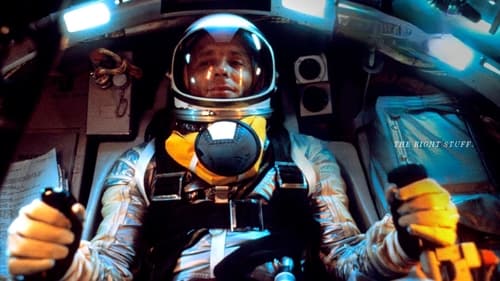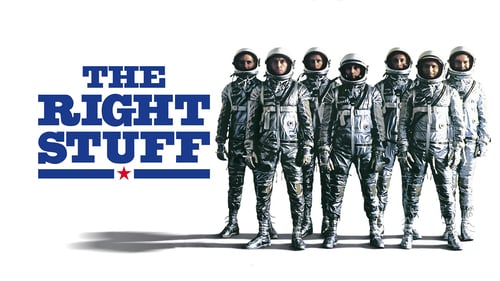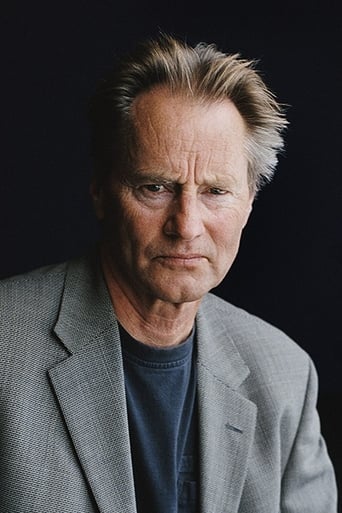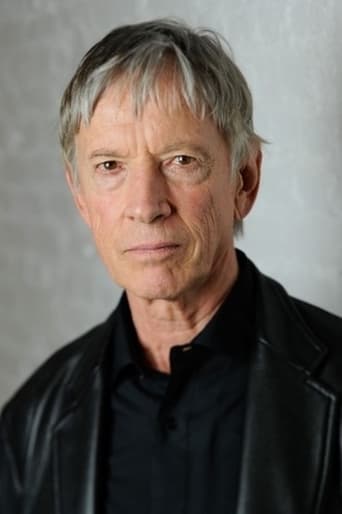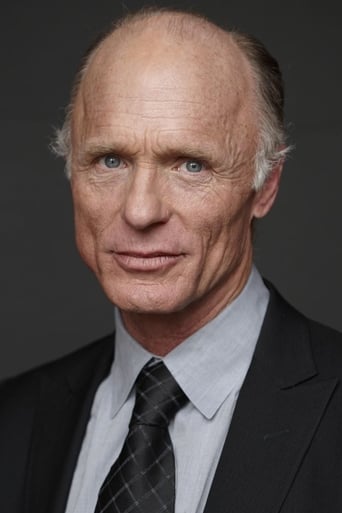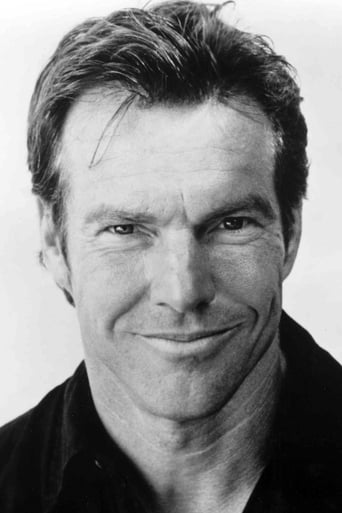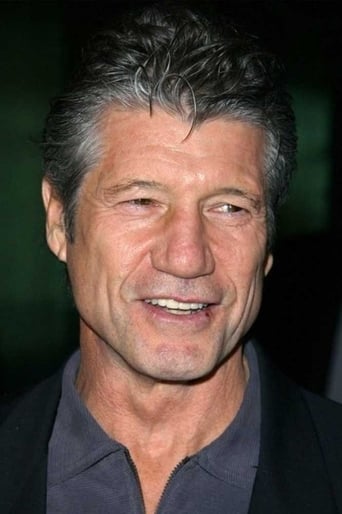Bardlerx
Strictly average movie
Claysaba
Excellent, Without a doubt!!
Melanie Bouvet
The movie's not perfect, but it sticks the landing of its message. It was engaging - thrilling at times - and I personally thought it was a great time.
Cassandra
Story: It's very simple but honestly that is fine.
svikasha
It's hard to understand the magnificent struggle of the Cold War for the average millennial today. This wasn't a struggle involving individual nations. This was a struggle that involved the massive mobilization of resources of global political power structures. The film industry was not untouched by this epic conflict. The Cold War has produced many films throughout the world that foster the competitive spirit of this struggle. But few films highlight the incredible technological legacy of this era better than "The Right Stuff".Many history buffs will tell you that the space race began when Russia launched a satellite into orbit. But this isn't the case. The space race began when a US pilot named Chuck Yeager broke the sound barrier and pushed the boundaries of the limitations of the human experience. "The Right Stuff" is a 1983 historical epic which was an adaptation of the bestselling book with the same title written by Tom Wolfe. The movie starts at Muroc Army Air Field in California right after World War 2 in 1947. "The Right Stuff" begins as a film about the old west meeting the modern era. The cowboys of old have dismounted the horses and are now flying jets across the dessert and testing the boundaries of human technology. Unfortunately, pushing the boundaries of human technology, especially in the context of airplanes can have deadly consequences. Countless test pilots die falling out of the California sky for their country. Very few actually lived to reflect on their experiences. These rare few, eventually become astronauts. The world couldn't be more out of luck. This fact is thoughtfully demonstrated in one scene where a former test pilot seeking admission into the astronaut training program thinks out loud to himself, "what does that word mean, astronaut?...it means space-traveler…I kind of like the sound of that". Of course the competition was brutal. Some test pilots like, Chuck Yeager, the man who in 1947 became the first pilot to have broken the speed of sound in flight, never became an astronaut. He continued to serve in leadership positions in the United States Air Force in a flying career that spanned more than 60 years and took him to every corner of the planet. Sam Shepard was nominated for an Academy Award for Best Supporting Actor for his skillful performance in this role. But John Glen, just like in real life, stole the show in this film.Glen is the ultimate American hero. For those who don't know of Glen's accomplishments beyond the scope of the film, let it be known that John Glenn would go on to be inducted into the Astronaut Hall of Fame and serve as a United States Senator. He is portrayed by Ed Harris who would go on to star in the 1995 film Apollo 13. In 1962, one of Glenn's many accomplishments, and one of the greatest accomplishments for mankind was piloting a craft in the Friendship 7 mission where he became the first American ever to orbit space. In doing so, he became the fifth person to ever enter space. This accomplishment is powerfully portrayed on film by "The Right Stuff". Glenn unfortunately died in late 2016 after a long and distinguished life. The lives of other astronauts and test pilots are also addressed. For example, the veteran astronaut Gus Grissom's struggle with the intense pressure of his position and the public's eye is touched on. Grissom would eventually die from asphyxiation during a pre-launch test at Cape Kennedy. So many more unnamed test pilots died during the cold war. There is no fitting way to truly honor their sacrifice. But this film is for them. It took until 2013, but the film was selected for preservation in the United States National Film Registry by the Library of Congress for being, "culturally, historically, or aesthetically significant". John Glenn, former test pilot, astronaut, and United States senator, will be laid to rest at Arlington National Cemetery. Both have already cemented their legacy as all-time greats. As John F. Kennedy stated at the height of the Cold War's space race, "Those who came before us made certain that this country rode the first waves of the Industrial Revolution, the first waves of modern invention, and the first wave of nuclear power. And this generation does not intend to founder in the backwash of the coming age of space. We mean to be a part of it. We mean to lead it".
higherall7
Based upon the book by Tom Wolfe, the subject matter and thematic content is 'a pooch that can't be screwed' in the words of that venerable old ace pilot Chuck Yeager as played by Sam Shepherd. I actually would have preferred seeing John Travolta play Yeager because of the undeniable physical resemblance and Travolta's well documented love of flying, but real life Yeager's cameo in the film is amusing and one can say makes up for the missed call about Travolta. This film is a fascinating exposition of the Western Ethos, which, among other things, asserts that you can figure it out and do something about it and that there is paradise on the other side of The New Frontier should you be willing to risk life and limb and accept this mission. This film is very interesting to compare with THE MAGNIFICENT SEVEN and of course, Kurosawa's internationally acclaimed SEVEN SAMURAI. While it would be presumptuous of me to claim it has the stature of the Kurosawa masterpiece, it deals with similar issues of bravery, duty and the willingness to sacrifice for values and ideals that are larger than oneself.Having read the book, I was somewhat disappointed that all six missions were not presented in a telescoping and accelerated manner, as the book was an excellent breakdown of different salient points of the Space Program in its embryonic beginnings. Scott Carpenter's mission was important to the film because he was actually doing experiments in the manner of a Space Scientist. He got so involved in his experiments he missed his landing site by over a hundred miles. Or was it a malfunction of the automatic stabilizer? Hmmnnn...? Wally Schirra's mission which was composed of maneuvering tests got more thoroughly into the actual mechanics of how one would pilot a craft in space and would have been interesting to see on film. A shame these missions were omitted. That being said, one cannot argue against the spell cast upon the viewer by the picaresque and elegiac flow of scenes and the compelling and at times rousing musical score of Bill Conti.Since I lived through the events of the Mercury program and remember vividly John Glenn's conversationally homey way of sharing his experience with all the world, the film has a great sense of resonance with me. Until the moon landing, it was probably the greatest reality show of its day. Ed Harris captures the force of the Glenn persona perfectly. Scott Glenn also gives us a fully colored, multi-layered Alan Shepard. The rest of the crew from Fred Ward as Gus Grissom to Scott Paulin as Deke Slayton to Lance Heriksen as Wally Schirra and Pamela Reed playing Trudy Cooper with Dennis Quaid as her husband Gordon Cooper to all the rest of the astronauts' wives and Barbara Hersey as Glennis Yeager as well as Kim Stanley as Poncho Barnes round out an ensemble that makes this more a character driven story in spite of its technological trappings and gravitas.But make no mistake, despite all the humor and memorable quotes by the truckload, this is a film that casts technology in an almost religious light and posits test pilots as members of a priesthood inevitably prone to spawn martyrs. Like the single combat warriors of a bygone age that Wolfe compares them to, or the samurai of more recent times, it appears that they live by a code as binding as the Bushido. Something unspoken and unwritten that has to be lived to be fully understood. Sam Shepard plays Chuck Yeager as a combination of Wyatt Earp, Abe Lincoln and Daniel Boone. He is all that the Western Heroic Mythos is about. The willingness to handle deadly force, the careful judiciousness of a humble servant of the people just doing his duty, the restless spirit of a frontiersmen anxious to play a part in a pioneering vision. Whether this is actually Chuck Yeager or not, it is still an attractive and charismatic portrayal.The last scenes say it all. While not as stirring as it was in the book, the scene involving Chuck Yeager's reach for the edge of Space, while the public relations machine all about LBJ grinds and dances around the Mercury Seven, still nails down that quality beyond macho that you find in a good parent, a good teacher, a good scientist or artist or inventor or a skilled expert at his trade having the time of his or her life against all odds. When the narrator who started this whole thing comes back in to wrap it all up the way Mark Twain would, we have a sense that we may have finally gotten a glimpse of people, warts and all, who truly have the - What was that question again? How many times did Gordon Cooper orbit the Earth? I think he went twenty-two times around, didn't he?
AaronCapenBanner
Philip Kaufman's soaring adaptation of Tom Wolfe's biographical account of the space program, starting with Chuck Yeager's(played by Sam Shepherd) breaking the sound barrier, to the Mercury 7, the first American astronauts(played by Ed Harris, Dennis Quaid, Fred Ward, Scott Glenn, Lance Henriksen, and others) to go into outer space. Film details the process of selection and training involved in preparing the astronauts for flight, as well as focusing on how they handle the media and each other. They are portrayed as real men, not cardboard cutouts, which is refreshing.A very well directed, written, and acted film is truly inspiring in how it portrays the successes and failures of these brave men, and the women in their lives. Though over three hours, it doesn't drag much, and is a most satisfying true story.
ma-cortes
This story broadly painted deals with the beginnings of the US space career and the first seven Mercury astronauts , being based on Tom Wolf's nonfiction novel . The space began when Chuck Yeager (Sam Shepard who played legendary pilot , is actually afraid of flying) broke the sound barrier and scorching Mach 2 and following to other aviation pioneers , the Mercury mission with 7 astronauts , the suicide squadron who volunteer for astronaut training is formed by a motley cast (Fred Ward , Dennis Quaid , Lance Henriksen , Ed Harris , Scott Glenn and Scott Paulin) , showing that no one had a clue how to run a space program or how to select volunteers to be in it. It was after the Soviets successfully launched the Sputnik satellite in 1959, that the U.S. redoubled its efforts to surpass at their trail of glory in the sky . Electrifying film with credible interpretations but overlong and oddly uninvolving , based on Tom Wolfe's ambitious book about the history of the U.S. Space program , it reads like a novel . However , Tom Wolfe, was unhappy with the film because he felt it made too many changes to the book. William Goldman, the original screenwriter before he left the project also disliked it because he didn't like the way Philip Kaufman portrayed Chuck Yeager as the only hero in the film, while the rest of the astronauts only got lucky and didn't match up to him in any way. The film has that same fictional quality ; furthermore is thrilling , imaginative , rowdy and overlong -at more than three hours , including unnecessary material - all at once . The picture attempts hardly to tell the tale of human beings as well as the space conquest . The movie tries to narrate parallel stories , though it never quite successfully integrate them . It covers the breaking of the sound barrier by Chuck Yeager -Sam Shepard- as a test pilot of the old breed , giving a nice and charming performance . It provides an all-star-cast who bolster a fine movie with special mention to Ed Harris playing John Glen who subsequently was running for President . The main cast is perfectly completed by known secondaries as Barbara Hershey , Pamela Reed , Veronica Cartwright , Kathy Baker , David Clennon , Scott Wilson , Jeff Goldblum , Royal Dano , Donald Moffat among others . Special effects work and production design by Geoffrey Kirkland is spectacular and could hardly be bettered ; however , some moments relies heavily from stock-shots . Colorful and atmospheric cinematography by Caleb Deschanel , the role of Annie Glenn was the first film role for his wife , Mary Jo Deschanel . Imaginative and evocative musical score composed and conducted by Bill Conti . The film's music temp track consisted of music from Holst's The Planets, Henry Mancini's score for The White Dawn and various other classical pieces which were favorites of Director 'Philip Kaufman'. ¨Right stuff¨ results to be Philip Kaufman's one of the most successful films . He's a good filmmaker and little prolific who left some great moments in histories that not be forgotten , giving enough inspired images to make linger in the memory such as happens in ¨Right stuff¨ . Kaufman realized a Western ¨Great Northfield Minnessota Raid¨, a youthful tale as ¨The Wanderers¨, Sci-Fi ¨ as ¨Invasion body snatchers¨and two sexual stories ¨Unbearable lightness of being¨ and ¨Henry and June¨.













